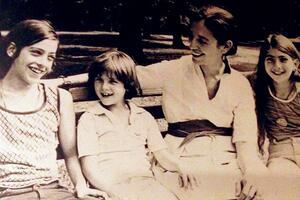Ruth Messinger: Inspiring Generations of Activism
Most of us, if not all of us, want to do the right thing in this life. But the hard truth that many activists and citizens must learn is that doing the right thing looks different to different people. Even people on the same side of the political spectrum who oppose the same politician can have very different ideas about the right kinds of actions to take; the groups to include in those actions; and the lens through which they should view their activism.
That’s why we need pros to show us the ropes—pros like longtime humanitarian and activist Ruth Messinger.
We at JWA are huge fans of Messinger, and at a time when we're mulling over what we can learn from Jewish women's activism to change the world, we found particular inspiration in a talk that Messinger, her daughter, and her granddaughter gave at a Human Rights Shabbat at Temple Hillel B’nai Torah in Boston, Mass. in the wake of the 2016 presidential election.
Messinger has a long and storied career: she served on the New York City Council and as Manhattan borough president in the 1980s and 1990s, and was the first woman to secure the Democratic nomination for New York City mayor. She served on Obama’s Global Policy Task Force and currently serves as global ambassador at the American Jewish World Service, which funds development projects worldwide. She has dedicated her career not necessarily to fighting for human rights, which she and her descendants view as an abstract, grand and unattainable idea, but to what they call human life work, which involves integrating the fight for liberation into everyday work and actions.
With so many decades of political and humanitarian experience under her belt, Messinger’s advice—and the advice of her accomplished daughter and granddaughter—is a guiding light in the storm of questions surrounding activism in the Trump era. One of Messinger’s main points during the talk was that activists need to build coalitions with members of other nationalities and religions. This is a question we at JWA have seen debated among our followers on our social media platforms: should the Jewish community ally with groups that some of us might disagree with on some issues, such as the Muslim community?
For Messinger, the answer is yes. She urged listeners to build coalitions across nationality and religion and together to target the areas where we can make the most difference. She asked activists to take risks, including reaching out to neighboring mosques and to the Islamic community, or even registering as Muslims if it comes to that.
She also urged the Jewish community to speak to Americans who were already ostracized even before Trump, who are marked by difference in physical appearance or dress in ways that liberal Ashkenazi Jews are not.
“It’s crazy to see how their worlds have changed even more dramatically than most of the people inside our room,” Messinger told the crowd.
Messinger also cautioned activists to listen to the groups they’re helping, to acknowledge that those groups have been living with forms of oppression and that they often know what they need better than an activist or humanitarian from a privileged background. She stressed the importance of accepting that ingrained race-based thinking will color activists’ interactions with disenfranchised groups. And she reminded activists to remain open-minded enough to change their opinions after talking to affected groups. To illustrate this point, she recalled an anecdote from her City Council days during the HIV crisis. At first, she said, she opposed needle exchange programs, questioning why she should support someone’s drug habits. But her constituents persuaded her to visit an illegal needle exchange and interview addicts who couldn’t kick their habit, but didn’t want to infect other people with dirty needles. After that experience, Messinger changed her mind about the program.
“I credit that as one of the key moments in learning to listen,” she said.
Messinger’s daughter, Miriam, also spoke at the event and stressed the importance of bringing awareness of one’s own background to activism. She said that growing up, although immersed in her mother’s altruistic world, she was very much what she called a “stage one activist”: someone who wants to help, but who doesn’t acknowledge that they are also part of the problem due to their participation in society’s unjust systems. For Miriam, it was essential to recognize her own privilege and even her own ingrained racism before she could move on to the higher stages of activism. Miriam described her activist evolution, which involves full acknowledgment that, even as an activist, she is part of the system, and as such is both oppressor and oppressed. She’s now beginning to understand “stage three activism” – taking a step back and liberating herself and others by just existing as humans together.
Ruth's and Miriam's words are applicable to all of us: it's essential that we acknowledge the personal and social baggage that we bring to our activism, as well as listen to the people we’re trying to help. We also must listen to each other—and even learn to listen to those who we may vehemently disagree with, and ask them to listen to us in return.
It's clear that Messinger’s expertise has inspired not just a generation of activists, but also her own family, who in turn have inspired her through sharing perspectives about how activism and ways of thinking about the world have changed throughout the years. Her granddaughter Amani, a student at Brown University, also spoke at the event, making it clear that like her grandmother and mother, she’s committed herself to understanding people who hail from other cultures and backgrounds, as well as challenging the institutions—such as the system of academia—that perpetuate the inequalities in our society.
Ultimately, Messinger’s most applicable points were the most universal. She urged her audience towards political involvement, reminding them that in climates such as these, “some are guilty, but all are responsible.” However, she also reminded her audience to avoid becoming overwhelmed, to take their activism one step at a time, and to effect change through small, essential actions. “To save one life is to save the world,” Messinger said. “That’s important to remember right now, when you feel like you can’t do anything.”








This is to Mirriam Messinger and others involved with social action at your synagogue. I am writing to look for adult ed speakers at a Sunday morning class at Temple Shir Tikvah in Winchester a year from now. Specifically about racism in America, how it has been institutionalized, embedded in our unconscious, effects on everyday life, white privilege, etc. Would anyone at Temple Hillel B'nai Torah or others that you know be able / willing to come give such a presentation at our temple in Winchester? Thanks, Lynne Brodsky